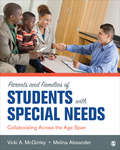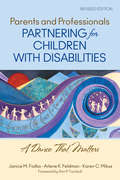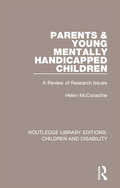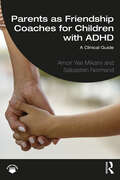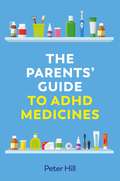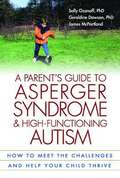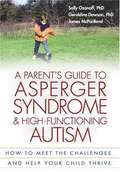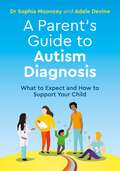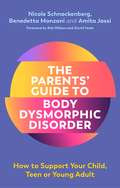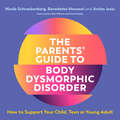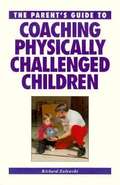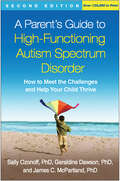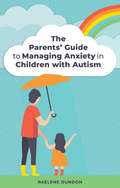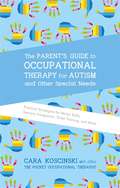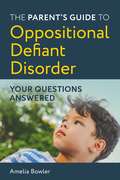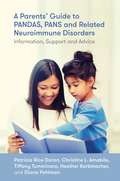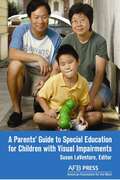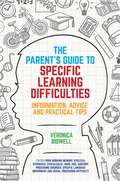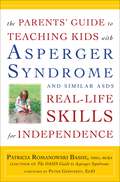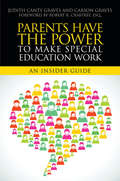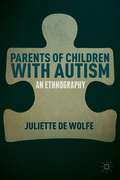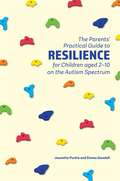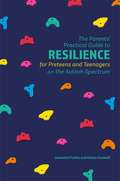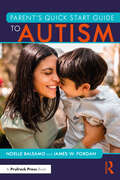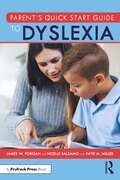- Table View
- List View
Parents and Families of Students With Special Needs: Collaborating Across the Age Span
by Dr Vicki A. McGinley Dr Melina AlexanderParents and Families of Students With Special Needs: Collaborating Across the Age Span teaches students the skills they need to effectively collaborate with parents and families to ensure a child's success in the classroom. Authors Vicki A. McGinley and Melina Alexander’s text takes a lifespan approach with a special emphasis on the critical transition points in a child’s life. Information is provided on what can be seen at each stage of an individual with disabilities’ development, and addresses concerns and needs that families may have during these unique phases of growth. Chapters written by professors and professionals who are also parents of students with special needs bring a diverse range of voices into the narrative. The authors provide an in-depth discussion of how parents and families are affected by particular disabilities, family system theory, the laws that affect individuals with disabilities, and assessments for individuals with disabilities.
Parents and Professionals Partnering for Children With Disabilities: A Dance That Matters
by Janice M. Fialka Arlene K. Feldman Karen C. MikusCultivate effective partnerships between parents and professionals Written from both the parent’s and the professional’s points of view, this book draws upon the metaphor of dance to highlight the essential partnership between teachers, administrators, support staff, and parents of children with disabilities. Rich with humor and heart, the book offers helpful steps for self reflection, personnel preparation, and parent-professional training. Key features include: Practical insights and evidence-based approaches to forming partnerships Easy-to-read, non-technical language that speaks to both the heart and the mind Sample letters, conversations, and other forms of communication between professionals and parents Effective ways to handle difficult situations
Parents and Young Mentally Handicapped Children: A Review of Research Issues (Routledge Library Editions: Children and Disability #10)
by Helen McConachieFirst published in 1986, this book reviews research on the role parents play in fostering the early development of children with mental handicaps. Professionals and parents must work together to give such children the chance of living as ordinary lives as possible and here, the author develops a broadly-based conceptual framework for the involvement of parents as teachers of their young handicapped children. McConachie identifies characteristics of parents which seem of particular relevance to the design and success of intervention programmes. Although written in the 1980s, this book discusses topics that are still important today.
Parents as Friendship Coaches for Children with ADHD: A Clinical Guide
by Amori Yee Mikami Sébastien NormandThis book introduces Parental Friendship Coaching (PFC), an intervention that parents can use to support peer relationships in their elementary school-aged children with ADHD. In the PFC program, clinicians work with parents to coach their children with ADHD in friendship behaviors that help develop and maintain high-quality relationships. Featuring 10 research-based clinical sessions, the book provides detailed, step-by-step instructions for clinicians about intervention provision. Each session includes skills teaching devoted to supporting children’s peer relationships, activities to practice the skills in session, problem-solving about difficulties carrying out the skills, and homework to try the skills at home. This book also includes handouts for parents and clinicians, tips for clinicians about addressing common parent difficulties, and suggestions for progress monitoring. Intended for mental health professionals working with families of children with ADHD and peer problems, this book will aid clinicians in educating parents on how to support their children’s friendship development.
The Parents’ Guide to ADHD Medicines
by Peter HillThis reassuring guide explains prescribed ADHD medicines for children in clear, everyday language. Based on questions the author has received from countless families in his work as a Consultant Psychiatrist, the expert information in this book answers the most pressing questions a parent will have about ADHD medicines: how they work, what they do, what is available and how to talk about them to your children. This book sheds light on why not all medicines are easily available, the differences between certain medications and their level of effectiveness, all based on scientific evidence. This information will support parents in discussions with medical professionals, explaining the practicalities and demystifying the terminology around medication and treatments. The book also provides insights into the decisions behind prescribing certain medicines and how they should be taken. Armed with this guide, parents - as well as teachers and others working with kids with ADHD - can feel confident and assured when their child is prescribed treatments for ADHD.
Parent's Guide to Asperger Syndrome and High-Functioning Autism
by Geraldine Dawson Sally OzonoffAsperger Syndrome and high-functioning autism are detected earlier and more accurately today than ever before. Children and teens with these disorders often stand out for their precocious intelligence and language abilities--yet profound social difficulties can limit every aspect of their lives. This hopeful, compassionate guide shows parents how to work with their child's unique impairments and capabilities to help him or her learn to engage more fully with the world and live as self-sufficiently as possible. From leading experts in the field, the book is packed with practical ideas for helping children relate more comfortably to peers, learn the rules of appropriate behavior, and participate more fully in school and family life. It also explains what scientists currently know about autistic spectrum disorders and how they are diagnosed and treated. Real-life success stories, problem-solving ideas, and matter-of-fact advice on everything from educational placements to career planning make this an indispensable reference that families will turn to again and again.
A Parent's Guide to Asperger Syndrome & High-Functioning Autism: How to Meet the Challenges and Help Your Child Thrive
by Sally Ozonoff Geraldine Dawson James McpartlandEmphasizing how to build on the talents and strengths of a high-functioning autistic child, it contains many useful case histories along with scientific and practical information.
A Parent's Guide to Autism Diagnosis: What to Expect and How to Support Your Child
by Adele Devine Sophia MoonceyAutism diagnosis can be an overwhelming time for many families. This is an accessible, easy to navigate guide for parents, answering the questions they may have before, during and after diagnosis. Written by a highly experienced author team, this book will support parents from the moment somebody mentions autism, through the diagnosis process and beyond. It provides reliable advice on every stage, with guidance on what to do during the long wait for assessment and diagnosis. Working from a pro-neurodiversity perspective it encourages parents to see beyond the diagnosis and to celebrate each child's unique personality and strengths. Combining information on medical diagnosis, educational needs and more, the book shares case studies and direct quotes from families to help parents to give their children the best start following an autism diagnosis, and help them to achieve their full potential. There is also a bonus downloadable chapter with information from the key professionals involved in the diagnostic process, so you know who you can turn to for the support and help you need.
The Parents' Guide to Body Dysmorphic Disorder: How to Support Your Child, Teen or Young Adult
by Nicole Schnackenberg Amita Jassi Benedetta MonzaniThe first book offering support for parents and carers of children and young people with Body Dysmorphic Disorder (BDD), this guidebook explains the condition as well as the impact that it may have in education settings, family life and socialisation.The guide begins by explaining how and why BDD emerges, before moving onto an exploration of how the mental health condition presents itself emotionally, psychologically, physically and behaviourally. It then offers practical advice and guidance for parents and carers on talking to their child about BDD, seeking professional treatment, considering medication, managing social media use, working with schools to build a recovery team and more.The Parent's Guide to Body Dysmorphic Disorder is an essential guidebook for parents of children of children and young people with BDD.
The Parents' Guide to Body Dysmorphic Disorder: How to Support Your Child, Teen or Young Adult
by Nicole Schnackenberg Amita Jassi Benedetta MonzaniThe first book offering support for parents and carers of children and young people with Body Dysmorphic Disorder (BDD), this guidebook explains the condition as well as the impact that it may have in education settings, family life and socialisation.The guide begins by explaining how and why BDD emerges, before moving onto an exploration of how the mental health condition presents itself emotionally, psychologically, physically and behaviourally. It then offers practical advice and guidance for parents and carers on talking to their child about BDD, seeking professional treatment, considering medication, managing social media use, working with schools to build a recovery team and more.The Parent's Guide to Body Dysmorphic Disorder is an essential guidebook for parents of children of children and young people with BDD.(P) 2020 Hodder & Stoughton Ltd
The Parents Guide to Coaching Physically Challenged Children
by Richard ZulewskiHandbooks in The Better Way Coaching Kids series serve as the perfect step-by-step introductory primers for parents and coaches. Written in an easy, conversational style, these books cover all the basic skill-building techniques, rules of the games, proper equipment and first aid. These guides focus on team spirit, the importance of fair play and overall fun. Special attention is paid to developing a child's confidence and self-esteem, -- all important keys to success.
Parent's Guide to High-Functioning Autism Spectrum Disorder, Second Edition: How to Meet the Challenges and Help Your Child Thrive
by Sally Ozonoff Geraldine Dawson James C. McpartlandMany tens of thousands of parents have found the facts they need about high-functioning autism spectrum disorder (ASD), including Asperger syndrome, in this indispensable guide. Leading experts show how you can work with your child's unique impairments--and harness his or her capabilities. Vivid stories and real-world examples illustrate ways to help kids with ASD relate more comfortably to peers, learn the rules of appropriate behavior, and succeed in school. You'll learn how ASD is diagnosed and what treatments and educational supports really work. Updated with the latest research and resources, the second edition clearly explains the implications of the DSM-5 diagnostic changes.
The Parents’ Guide to Managing Anxiety in Children with Autism
by Raelene DundonThis guide for parents is a complete introduction to autism and anxiety. Drawing on the author's clinical experience working with children and their families, it provides parents and carers with everything they need to know to help support their child. It covers the basics such as what anxiety is, how it manifests behaviourally and why it is common in autism, before presenting CBT-informed practical strategies for managing a common range of anxieties: separation, social, performance, phobias, and generalised anxiety. It also has chapters dedicated to related behaviours including Pathological Demand Avoidance (PDA) and advice on managing meltdowns.This is a clear, concise and practical guide that answers any questions that parents and carers might have about anxiety and provides support strategies to help children with autism manage a range of anxieties.
The Parent's Guide to Occupational Therapy for Autism and Other Special Needs: Practical Strategies for Motor Skills, Sensory Integration, Toilet Training, and More
by Cara KoscinskiWith the help of this handy guide, you can bring tried and tested occupational therapy activities into your home and encourage your child to succeed with everyday tasks while having fun in the process. This expanded edition of the award-winning book includes new advice on toilet training, coping with changes in routine, repetitive behaviors, self-regulation and much more. The simple explanations and easy exercises will soon make daily activities enjoyable and productive.
The Parent’s Guide to Oppositional Defiant Disorder: Your Questions Answered
by Amelia BowlerThis parenting guide to ODD offers expert information on your child's condition, provides insight and empathy to what they are going through, and equips and empowers you to make practical changes in your parenting approaches. It provides an overview of tried-and-tested techniques from a mother of a child with ODD to support you in response to typical questions you may have:· "Why is my child acting this way?"· "What does this say about me?"· "Why doesn't my child respond to punishment or reward?" · "What am I supposed to do next?"Overall this book teaches you how to avoid common mistakes in responding to ODD, the crossover with similar diagnoses such as ADHD and how to distinguish the disorders, how to improve your own resilience and confidence to communicate effectively with your strong-willed child, and start rebuilding the relationship you have.
A Parents’ Guide to PANDAS, PANS, and Related Neuroimmune Disorders: Information, Support, and Advice
by Patricia Rice Doran Christine Leininger Amabile Diana Pohlman Tiffany Tumminaro Heather Rain KorbmacherHaving a child who suddenly develops PANDAS (Pediatric Autoimmune Neuropsychiatric Disorders Associated with Strep), PANS (Pediatric Acute-onset Neuropsychiatric Syndrome) or related conditions such as encephalitis can be a daunting challenge for parents. This clear guide explains the symptoms and diagnosis of PANDAS and PANS, with treatment options and recommended strategies for supporting children at home, at school, and in community settings.The book covers key symptoms including OCD, tics, anxiety, sensory issues and personality changes, with practical advice on medical management, nutrition, lifestyle, and addressing social and behavioural needs. Each chapter also includes handy sidebars with key information to remember, and action steps for overcoming challenges, managing relapse, family self-care and providing children with the best possible support.
A Parents' Guide to Special Education for Children with Visual Impairments
by Susan LaventureThis handbook for parents, family members and caregivers of children with visual impairments explains special education services that these children are likely to need and to which they are entitled--and how to ensure that they receive them. Edited and written by experienced parents and professionals, this helpful and easy to use resource addresses the effect of visual impairment on a childs ability to learn and the services and educational programming that are essential for them to get the best education possible. Chapters address early intervention, assessment, different types of services, IEPs, accommodations and adaptations, different types of placements, children with other disabilities in addition to visual impairment, and negotiation and advocacy.
The Parents' Guide to Specific Learning Difficulties: Information, Advice and Practical Tips
by Veronica BidwellPacked full of advice and practical strategies for parents and educators, this book is a one-stop-shop for supporting children with Specific Learning Difficulties (SpLDs). Part one introduces a spectrum of SpLDs, ranging from poor working memory, dyslexia, dyspraxia, dyscalculia, through to ADHD, Autism Spectrum Disorder (ASD), Auditory Processing Disorder (APD), Specific Language Impairment and Visual Processing Difficulty. It explains clearly what each difficulty is, how it can affect a child's learning and how to help a child to succeed despite their difficulties. Part two includes a host of tips, tools and strategies to support your child's efforts in areas such as reading, writing, spelling and handwriting, as well as advice on motivation, confidence and managing life's setbacks. Written by an experienced Educational Psychologist, this is the perfect guide for parents and carers who are looking for ways to support their child's learning, as well as for educators and teachers looking for advice on how to differentiate lessons and motivate pupils with SpLDs.
The Parents' Guide to Teaching Kids with Asperger Syndrome and Similar ASDs Real-Life Skills for Independence
by Patricia Romanowski Peter GerhardtThe definitive resource for teaching kids with Asperger syndrome the life skills that build independence, confidence, and self-esteem. Children with autism spectrum disorders learn differently. Our kids' choices are too often limited and their paths to success restricted, not by a lack of intellectual ability but by deficits in acquiring, applying, and generalizing basic life skills. Success in school, at home, on the playground, and beyond depends on mastering countless basic living skills that most other kids just "pick up" almost by osmosis. This book shows parents how to teach these so-called easy skills to complex learners. This is the first book for parents and caregivers of kids with Asperger syndrome and similar learning profiles that features strategies based on applied behavior analysis--the most widely accepted, evidence-based, and effective teaching method for learners with ASDs--including how to: -Identify critical skills appropriate for your child's age--how to teach them and why-Implement new techniques that can replace, mimic, prompt, override, or impose missing order on your child's learning style -Design a curriculum for your child that reduces reliance on prompts (including parents) and promotes new learning, new behaviors, and independenceFrom the Trade Paperback edition.
Parents Have the Power to Make Special Education Work: An Insider Guide
by Judith Canty Graves Carson GravesWritten by parents who have been through the US special education system, this book cuts through the jargon to provide other parents with a no-nonsense road map full of valuable first-hand insights and tried-and-tested advice. The authors clearly describe: · the special education process, including the school hierarchies parents are likely to encounter and etiquette to be aware of when dealing with school personnel · the information parents should expect to see in school evaluations and Individualized Education Programs (IEPs), and what to do when this information is missing or insufficient · problems parents may encounter when the needs of the school conflict with the needs of a child, including how to deal with such situations and when to seek legal advice · the importance of organizing special education documentation and establishing a 'paper trail', and how to begin this process · why transition planning is so important, and transition services parents may want to consider for their child. Demonstrating that parents really do have the power to make special education work for their child, this empowering guide is essential reading for parents of children with disabilities who are new to the special education system in the US, as well as those who feel frustrated with the system.
Parents of Children with Autism
by Juliette De WolfeIn a readable and highly accessible ethnographic account that is shaped by the stories of families and the voices of parents, De Wolfe examines how parents of children with autism navigate the educational and medical systems, understand their own and their children's bodies, and support and educate one another.
The Parents' Practical Guide to Resilience for Children aged 2-10 on the Autism Spectrum: Two to Ten Years
by Jeanette Purkis Emma GoodallChildren and young people with autism have the capacity to be independent and resilient which can help them live independently or be supported to live a fulfilling life and reach their full potential. This book empowers parents of autistic children aged two to ten to help them promote resilience in their child. Full of suggestions and simple activities, this easy-to-use resource will help guide parents on how to build the foundations of resilience and independence for situations such as school, new environments and relationships with other children. It includes information about the main developmental stages for children on the autism spectrum, and will take parents through life events and milestones at different ages and identify where difficulties and barriers to resilience may arise and how to address them.
The Parents’ Practical Guide to Resilience for Preteens and Teenagers on the Autism Spectrum
by Jeanette Purkis Emma GoodallThis book empowers parents of autistic young people aged 11 to 20 to help them promote resilience in their child. Full of suggestions and simple activities, this easy-to-use resource will help guide parents on how to build the foundations of resilience and independence for situations such as negotiating sexuality and relationships, entering employment or living away from home. It includes information about the main developmental stages for preteens and teens on the autism spectrum, and will take parents through life events and milestones at different ages and identify where difficulties and barriers to resilience may arise and how to address them.
Parent's Quick Start Guide to Autism
by Noelle Balsamo James W. ForganParent’s Quick Start Guide to Autism provides parents and caregivers with an immediate overview of autism spectrum disorder (ASD) and steps they can take to support and encourage their child. Each chapter is packed with detailed and helpful information, covering what to do at home and at school, how to avoid common mistakes, and how (and when) to seek professional help. Summary and resource sections at the end of each chapter give quick guidance to busy readers. Topics include occupational therapy, applied behavior analysis (ABA), cognitive behavioral therapy (CBT), interventions, and more. Offering straightforward, easy to understand, and evidence-based information, this book is a go-to resource for caregivers parenting a child with autism.
Parent’s Quick Start Guide to Dyslexia
by James W. Forgan Noelle BalsamoParent’s Quick Start Guide to Dyslexia provides parents and caregivers with an immediate overview of dyslexia and steps they can take to support and encourage their child. Each chapter is packed with detailed and helpful information, covering identification, public schools versus private settings, and how (and when) to seek professional help. Summary and resource sections at the end of each chapter give quick guidance to busy readers. Topics include a wealth of research-backed activities, nurturing talent and creativity, motivating your child to read, and more. Offering straightforward, easy to understand, and evidence-based information, this book is a go-to resource for caregivers parenting a child with dyslexia.
